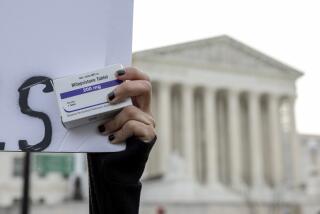FDA Takes Another Look at MS Drug
- Share via
WASHINGTON — Multiple sclerosis patients pleaded with the Food and Drug Administration on Tuesday to again allow sales of a drug they described as a miracle for the disabling disease, while the family of a woman who died taking it warned of devastating side effects.
The drug, Tysabri, was withdrawn from the market in February 2005 after three patients unexpectedly developed a rare brain infection usually seen in AIDS patients and others with weak immune systems. Two of them died. Now the manufacturers are asking the FDA to allow Tysabri to be prescribed again, with a series of limitations on its use.
Such a reversal would be highly unusual. And because there are compelling arguments on both sides, the case is seen as particularly difficult for the FDA advisory panel that will recommend whether to return the drug to market.
The panel of experts is scheduled to vote today, the second day of a public hearing that has included testimony from FDA staff members, pharmaceutical company officials, patients and advocates on both sides.
Tysabri has been shown to be twice as effective as available drugs in preventing recurring bouts of MS, which affects an estimated 300,000 Americans, most of whom are diagnosed between the ages of 20 and 50. It also appears to delay the overall worsening of the disease.
But Tysabri, manufactured by Biogen Idec Inc. of Massachusetts and Elan Corp. of Ireland, also has the potential to affect the immune system. An estimated 1 in 1,000 patients may contract a brain infection known as progressive multifocal leukoencephalopathy, or PML. The infection is not easily diagnosed in its early stages and there is no effective cure for it.
According to an FDA analysis, Tysabri patients may also be susceptible to other types of unusual infections.
The husband and the daughter of Anita Smith, who died while taking the drug, told the panel that the 46-year-old woman should have never been offered Tysabri because her form of MS was mild. She could walk up and down stairs and carry loads of laundry. A doctor who has since reviewed the case for the family agreed with their assessment.
But her family said she was persuaded to enroll in a clinical trial of the drug, at least in part by the promise of free medication. Her previous treatment had cost $1,000 a month, the family said. From April 2002 to early 2005, Smith received 37 doses of Tysabri, which she took about once a month by intravenous infusion.
“We were never told Tysabri could result in Anita’s death. If we had known that, we would have happily stayed away from the trial,” said Beth Ann Smith, reading a statement for her father, Walter.
The family left without taking questions from reporters. The Smiths are suing Biogen Idec and Elan.
But Barbara Crooks told the committee that “life is all about trade-offs,” and that she was willing to take a calculated risk in order to enjoy the benefit of Tysabri again. At 48, Crooks uses a cane in each hand or a wheelchair to get around. She has had to give up her job as a medical technician. Before she became ill, she said, she played basketball with her son and rode horses with her daughter.
Crooks, who lives in Irwin, Pa., was among several patients who urged that Tysabri be returned to the market. She said she was given three doses before it was withdrawn and considered it the most effective MS medication she had ever taken.
“I felt like I had some legs under me,” she said in an interview. “It was like taking a humongous Tylenol.”
Multiple sclerosis is a disease in which the immune system turns on the body, attacking the protective coating of nerves in the brain and the spinal cord. It can cause blurred vision, numbness, fatigue and paralysis. Though not considered fatal, it can lead to complete disability.
Tysabri, the first new MS drug in 10 years, was approved for sale in 2004 after a series of clinical trials. It is thought to work by preventing certain immune cells from attacking the nervous system. But FDA staff doctors said it might also block infection-fighting cells from reaching places in the body where they were needed.
If Tysabri is re-approved for sale, the manufacturers have pledged to institute a system of requirements and checks to try to prevent problems.
For example, doctors would be strongly warned not to prescribe the drug to patients who were taking other medications that could suppress the immune system, as Anita Smith was. Doctors, patients and infusion centers administering the drug would have to enroll in a mandatory risk monitoring network.
After the FDA staff criticized the manufacturers’ initial risk reduction plan, the companies made several improvements sought by the agency. But the FDA staff told the committee Tuesday that the long-term risks and benefits of the drug were still not well understood.






